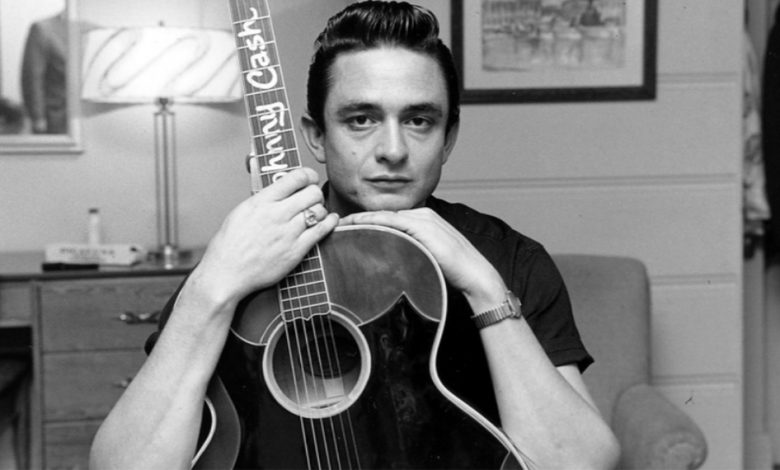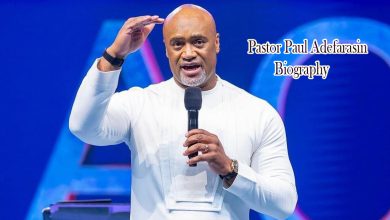Johnny Cash Biography

Johnny Cash Biography – Johnny Cash (February 26, 1932 – September 12, 2003) was one of the most iconic and influential figures in the history of American music.
Known as the “Man in Black,” Cash was a singer, songwriter, and musician whose career spanned over five decades. His music blended country, rock and roll, blues, folk, and gospel elements, making him a crossover artist with a unique and lasting impact on multiple genres.
Johnny Cash Details
Name: Johnny Cash
Born: February 26, 1932
Died: September 12, 2003
Born in: Kingsland, Arkansas, USA
Died in: Nashville, Tennessee, USA
Occupation: Singer, Songwriter, Actor
Genres: Country, Rock and Roll, Gospel, Blues, Folk
Years Active: 1954–2003
Spouse: Vivian Liberto (married 1954–1966), June Carter (married 1968–2003, until her death)
Early Life
Johnny Cash was born to Ray and Carrie Cash on February 26, 1932, in Kingsland, Arkansas. He was the fourth of seven children in a poor, hardworking family that struggled through the Great Depression. Growing up in the cotton fields of Arkansas, Cash’s early life was shaped by hardship and poverty. His family’s struggle to make ends meet made a lasting impression on him, and he often drew from these experiences in his later music.
As a boy, Johnny was particularly close to his older brother, Jack, who tragically died in a sawmill accident when Johnny was just 12. This loss had a profound impact on him and was something he carried with him throughout his life, often referencing it in his music. Cash also developed a love for music early on, and he began playing guitar and writing songs in his youth.
Military Service
In 1950, at the age of 18, Johnny Cash enlisted in the United States Air Force during the Korean War. He served as a radio operator and Morse code operator, based in Landsberg, Germany. It was during his time in the Air Force that he formed his first musical group, The Landsberg Barbarians, and began to write and perform more seriously. His military service helped shape his worldview, which would later be reflected in his songs about struggle, loss, and redemption.
Early Music Career
After his service, Cash moved to Memphis, Tennessee, to pursue a career in music. In 1954, he auditioned for Sam Phillips at Sun Records, one of the most famous independent labels in America, known for discovering legendary artists like Elvis Presley and Jerry Lee Lewis. Although Phillips initially thought Cash might be better suited for gospel music, he recognized his unique voice and style and offered him a recording contract.
Cash’s first single for Sun Records, “Hey, Porter,” was released in 1955 and had some success, but it wasn’t until his 1956 song “I Walk the Line” that he became a household name. The song’s distinctive rhythm, Cash’s deep baritone voice, and its theme of fidelity and commitment became an instant classic. It reached number one on the country charts and signaled the beginning of his long, successful career.
Over the next few years, Johnny Cash’s career flourished. Hits like “Folsom Prison Blues” (1955), “Cry! Cry! Cry!” (1955), and “I Walk the Line” solidified his reputation as a pioneer of the “outlaw” country style, which combined elements of country, rockabilly, and folk music with lyrics that often spoke of hardship, redemption, and personal struggle.
Personal Struggles and Musical Growth
Throughout the 1960s, Cash’s personal life and music underwent significant transformations. He married Vivian Liberto in 1954, and they had four daughters. However, his marriage was strained by his growing addiction to amphetamines and other drugs, which began to affect both his personal life and career. Cash’s battles with substance abuse were well-documented, and he struggled with addiction for much of his life.
Despite these challenges, his music continued to evolve. In the 1960s, Cash recorded some of his most iconic songs, including “Ring of Fire” (written by June Carter) and “The Man in Black,” a self-reflective song that became a signature of his public persona. His style was characterized by a deep, resonant voice and lyrics that were raw and honest, often dealing with themes of sin, redemption, and personal suffering.
In 1968, Cash married June Carter, a member of the famous Carter Family, who was also a talented singer and songwriter. June played a pivotal role in helping Johnny overcome his addiction and guiding him through some of the most difficult periods of his life. Their marriage was one of the most iconic in country music history, and the two performed together in a series of highly successful duets. June was not only a professional partner but a personal one, helping Cash navigate his demons and return to a path of redemption.
The “Man in Black”
Cash became known as the “Man in Black” because of his signature attire—black suits and shirts—which he wore as a statement of solidarity with the downtrodden and oppressed. The “Man in Black” persona reflected his growing empathy for people who were marginalized, including prisoners, the poor, and the disadvantaged. His 1971 song “Man in Black” laid out his reasons for wearing black, stating that he did so in solidarity with the suffering in the world, and it became an anthem of social consciousness.
During the late 1960s and early 1970s, Cash’s popularity was further cemented with his television show, The Johnny Cash Show, which aired from 1969 to 1971. The show featured not only Cash but also a wide range of musical guests, including Bob Dylan, Neil Young, and Kris Kristofferson, among others. It became a platform for both country and rock musicians and helped broaden Cash’s appeal to a new generation of fans.
The Prison Concerts
One of the most iconic moments in Johnny Cash’s career came in the 1960s when he performed live at Folsom Prison in California in 1968. This concert, which was recorded and released as an album, is considered one of the greatest live performances in the history of music.
The live album, At Folsom Prison, was a huge commercial success and reinvigorated Cash’s career. His connection with the prisoners was palpable, and his performance exuded a sense of empathy and understanding for those who were incarcerated.
Cash would later perform similar concerts at other prisons, including San Quentin, where he recorded the live album At San Quentin in 1969. These prison performances further solidified his image as an artist who championed the underdog and whose music resonated with those living on society’s margins.
Later Years and Legacy
Throughout the 1980s and 1990s, Johnny Cash’s music began to reflect the changes in the American music landscape, and his fame started to wane. However, in the early 2000s, he made a remarkable comeback with the American Recordings series, produced by Rick Rubin.
These albums featured stripped-down arrangements of some of Cash’s old hits, as well as covers of songs by modern artists like Nine Inch Nails, Tom Petty, and U2. His cover of Nine Inch Nails’ “Hurt,” released in 2002, became one of his most critically acclaimed tracks and was widely regarded as a haunting, poignant meditation on aging, regret, and mortality.
Cash’s late career also saw him recognized with numerous accolades, including multiple Grammy Awards and honors from the Country Music Hall of Fame. In 2003, at the age of 71, Cash passed away just months after his beloved wife June Carter Cash died from complications related to heart surgery. His death marked the end of a career that had spanned over five decades.
Influence and Legacy
Johnny Cash is widely regarded as one of the most influential musicians of the 20th century. His blending of country, folk, rock, and blues reshaped the American music landscape. Known for his deep, distinctive voice and his uncompromising honesty, Cash’s songs have influenced countless artists across genres, from Bob Dylan and Bruce Springsteen to modern country and alternative rock bands.
Cash’s legacy is one of resilience, transformation, and compassion. His music continues to resonate with listeners who find solace in his powerful storytelling and raw honesty. As a performer, he was known for his charismatic stage presence and his ability to connect with audiences on a deeply personal level. Whether performing for prisoners or large crowds, Cash never lost sight of the human struggles that fueled his art.
His life and career were immortalized in the 2005 biographical film Walk the Line, which won multiple Academy Awards and helped introduce his music to a new generation of fans. The film, starring Joaquin Phoenix as Cash and Reese Witherspoon as June Carter, depicted his rise to fame, his struggles with addiction, and his redemptive journey through love and faith.
Johnny Cash’s music, spirit, and personal story continue to inspire and captivate millions around the world, ensuring that his place in the pantheon of American music legends remains secure.
Musical Legacy
Johnny Cash is remembered as one of the greatest and most influential musicians in American history. His music transcended genres and appealed to a wide audience, from country fans to rock enthusiasts, and his songs continue to resonate with people around the world.
Key songs and albums include:
- “I Walk the Line” (1956)
- “Folsom Prison Blues” (1955)
- “Ring of Fire” (1963)
- “Man in Black” (1971)
- “Hurt” (2002)
- At Folsom Prison (1968)
- American IV: The Man Comes Around (2002)
Johnny Cash’s influence can be seen in countless artists who followed, from Bob Dylan to Bruce Springsteen to Kris Kristofferson. His ability to connect with the emotional struggles of ordinary people, combined with his raw musical talent, ensured his place in the pantheon of American music legends.
Johnny Cash: Age, Parents, Family, Ethnicity, and Education
Age
Johnny Cash was born on February 26, 1932, and passed away on September 12, 2003, making him 71 years old at the time of his death.
Parents and Family
Parents:
Father: Ray Cash
Mother: Carrie Cash (née Rivers)
Johnny Cash’s parents, Ray and Carrie, were both born into poor families in rural Arkansas. They raised Johnny and his six siblings in difficult conditions during the Great Depression, which had a lasting impact on Cash and influenced many of his later songs about poverty, hardship, and the struggles of the working class.
Siblings: Johnny Cash had six siblings, and the Cash family lived in a modest house on a farm in the small town of Kingsland, Arkansas. Cash was the fourth of seven children. His siblings were:
- Roy Cash
- Jack Cash (Johnny’s older brother, whose tragic death had a profound impact on him)
- Reba Cash
- Johnny Cash
- Margaret Cash
- Joanne Cash
- David Cash
The death of Jack Cash, Johnny’s older brother, in a tragic sawmill accident when Johnny was just 12 years old, had a significant emotional impact on him. Johnny often referred to Jack as a guiding light in his early life, and Jack’s death is frequently cited as a formative moment that shaped both his emotional state and his music.
Children: Johnny Cash had five children from his two marriages:
- Rosanne Cash (born May 24, 1955) – His eldest daughter with his first wife, Vivian Liberto. She went on to become an accomplished country singer-songwriter in her own right.
- Kathy Cash (born 1956) – His second daughter, also from his first marriage.
- Cindy Cash (born 1959) – His third daughter from his first marriage.
- Tara Cash (born 1961) – His youngest daughter from his first marriage.
With June Carter, his second wife, Johnny had one son:
John Carter Cash (born March 3, 1970) – The couple’s only child. John Carter Cash has gone on to become a respected music producer, songwriter, and author, and has worked on preserving and promoting his father’s legacy.
Johnny Cash: Personal Life, Relationships, Net Worth, and Business Ventures
Johnny Cash’s personal life, particularly his marriages and relationships, was often intertwined with his music and struggles, making it as compelling and impactful as his legendary career. His business ventures and financial standing also tell the story of a man who was not only an iconic artist but also a survivor of the personal and professional challenges that defined his era.



